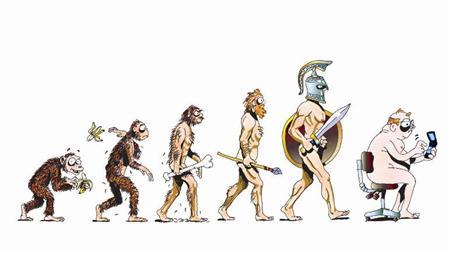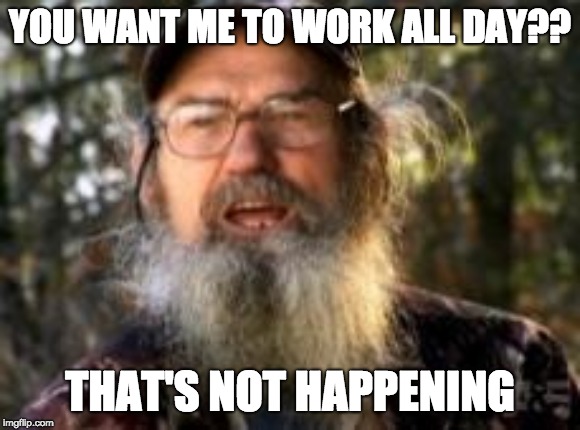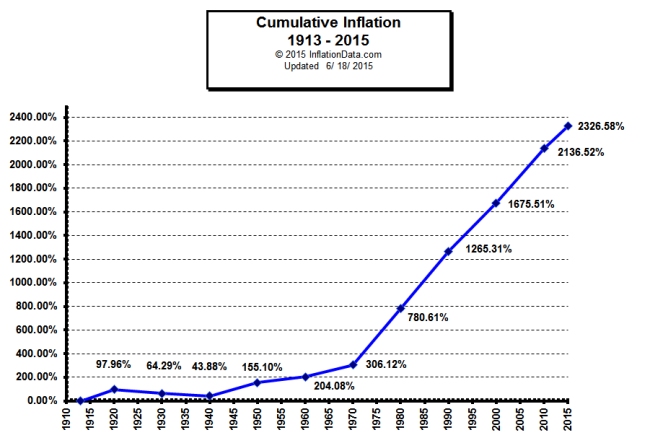changing the game : why the modern man is becoming a slave to consumerism
life·@metama·
0.000 HBDchanging the game : why the modern man is becoming a slave to consumerism
.jpeg)
# The life of the modern man
wake up.
work.
consume.
go to sleep.
# a history of work
This regimen seems to be the norm for many of us.
With entertainment constantly at our fingertips
and amazon allowing effortless purchasing
the modern man (and woman) has become an expert of consumption
day in and day out we intentionally, and sometimes not, consume information, products and energy from the moment we awake to the moment our consciousness fades into sleep
the modern life has become one of digitized, hyper concentrated stimulus and a discrete lack of connection from this information grid.
... *we've found ourselves a bit off track*
# we are here to discuss work.
in order to understand work in the modern era we must learn the history of work
Lets start with a brief history of mankind
We can all trace our roots back to a hunter-gatherer ancestor of some kind.
## life was simpler then.
Gather what grew around you.
Hunt and kill to supplement your diet.
There were short periods of intense energy expenditure followed by long periods of leisure
[Marshall Sahin](https://en.wikipedia.org/wiki/Marshall_Sahlins) was the first to propose the idea of "the original affluent society".
He claimed our ancestors lived much differently than we do today.
Using data taken from various foraging tribes in the modern era Sahlin argued that the *pre-historic* individual only spent 15-20 hours working per week! [1]
## what!??!
It sounds pretty luxurious.

# next came agriculture
During the agricultural revolution we saw a noticeable uptick in hours worked.
many anthropologists argue that our *simpler* ancestors still worked less than us
>The labouring man will take his rest long in the morning; a good piece of the day is spent afore he come at his work; then he must have his breakfast, though he have not earned it at his accustomed hour, or else there is grudging and murmuring; when the clock smiteth, he will cast down his burden in the midway, and whatsoever he is in hand with, he will leave it as it is, though many times it is marred afore he come again; he may not lose his meat, what danger soever the work is in. At noon he must have his sleeping time, then his bever in the afternoon, which spendeth a great part of the day; and when his hour cometh at night, at the first stroke of the clock he casteth down his tools, leaveth his work, in what need or case soever the work standeth.
- James Pilkington, Bishop of Durham, ca. 1570
In agricultural societies, worked revolved around the production and harvesting of crops. There were certain *critical* periods where long work periods were necessary IE : preparing fields, planting and harvesting. In other periods our ancestors may have experienced a degree of leisure that is quite uncommon to the modern man.
These societies were halmarked by enormous chunks of time carved out for leisure, rest and holidays. In *Discussions of Holidays During the Middle Ages*, Edith Rodgers claims that individuals in France were guaranteed fifty-two Sundays, ninety rest days, and thirty-eight holidays. In Spain, travelers noted that holidays totaled five months per year. [2]
Even though their work was physically demanding, the lives of our medieval ancestors seems to have included much more leisure than ours.
# enter the industrial revolution
*things start to get a little bit strange*.
The invention of electricity allowed individuals to work at all hours of the day. The steam engine harnessed mechanical energy and which dramatically increased the harvesting, distribution and manufacturing of raw materials. Cities began to fill with people as factories offered sought after jobs. The number of hours worked per week began to sky rocket.
During the 19th century, individuals worked more than 60 hours per week. In some instance individuals were working 80 plus (sounds like silicon valley). In 1869, president Ulysses S. Grant mandated that all government workers would be gauranteed an 8 hour workday (no more) without a decrease in pay. This marked the reformation of work in the United States.
Additional industries began to join suit, increasing workers rights throughout the United States. However, most individuals still worked Monday through Saturday for a total of 48 hours per week.
In 1926, Henry Ford issued a statement creating the 40 hour work week, 8 hours per day, Monday through Friday. [3]
The 40 hour work week became the norm in the United States and in many countries around the world. In 2004, the CDC released a summary of over 50 studies arguing that working over 40 hours per week is not only detrimental to the health of workers, but also leads to a decrease in overall productivity. [4]
Through out the majority of the 20th century we saw a decrease in hours worked. The 40 hour workweek was signed into law with the [Fair Labor Standards Act](https://en.wikipedia.org/wiki/Fair_Labor_Standards_Act_of_1938) in 1938.
# during the later parts of the 20th century things began to change
In a study done by the Bureau of Labor Statistics, it was found that while average # of hours worked per week has remained relatively stable, the % of individuals that are working longer hours (>40 per week) is increasing. [5] We see this in corporate America, the tribe of Silicon Valley and even with *average* people who are having to work multiple jobs to support themselves.
# why?
I am not an economist, but I do have an opinion.
In the 1970's, 3 things happened.
* Nixon debased the US dollar, no longer backing it by gold
* We saw the beginning of the US debt increase (it had been going down since the end of WWII)
* The US work week began to slowly increase
Now, this may be coincidence, but I see a correlation between these. The United States is reliant on an ever-growing economy in order to manage it's current policy of deficit spending. And if you are a country with ever growing debt payments, you need a similar increase in tax revenue to afford them.
I think that our country created this philosophy of consumerism, to increase our overall GDP so that we could maintain this *image* of financial success. I say image intentionally because a historical look at inflation shows us that while average incomes have increased (in dollar value), the purchasing strength of that income has gone down.

Our population is being tricked into excessive consumption, often funded by high interest debts, while they are earning less and less. This has weakened the middle class and left us with a humungous class divide. In my opinion, **it has all been done strategically and intentionally.**
# come to your own conclusions
But I have certainly come to mine.
I have no desire to slave away to foot the tax bill of my *irresponsible* government. I have no desire to trade my blood, sweat and tears for a foreign war I have **NO** interest in participating in. Our culture, and many others, has been led to believe that consumerism is the main quantifier of success. If you look at events such as Black Friday, you can see how *toxic* we have grown in the name of consumerism.
# it is time to change the status quo
I support capitalism, yet we always need balance.
That is why I have started this movement, The Alt Rich.
One does not need to have material goods to have riches
https://www.youtube.com/watch?v=iGKLkaRs1NE
We must choose what we value, and not allow someone else to define our personal success.
When we allow someone else to define value in life, we become a cog in *someone else's* plan.
# stop consuming the things that are being forced down your throat.
# take the time to ask yourself, *is this really valuable to me*
When you re-evaluate life in this manner you become rich instantly.
## my riches are
* personal freedom
* my love, joy and happiness
* time spent with loved ones and in nature
These are things that are intrinsically my own and can NOT be taken from me.
The Alt Rich is a movement. We are here to inspire and educate.
# Will You Join Us??
Sources:
1: https://en.wikipedia.org/wiki/Original_affluent_society
2: Edith Rodgers, Discussion of Holidays in the Later Middle Ages (New York: Columbia University Press, 1940), 10-11.
3: https://www.cnbc.com/2017/05/03/how-the-8-hour-workday-changed-how-americans-work.html
4: https://www.cdc.gov/niosh/docs/2004-143/pdfs/2004-143.pdf
5: https://www.bls.gov/opub/mlr/1997/04/art1full.pdf👍 cosmophobia, cryptouno, mys, steeming-hot, imperfect-one, steem-hikers, arv1, merlin7, mcoreyy, warwarmyit, murhadimur, ahmedhassan12, qilo, zulhamefendi, seuramoeoutdoor, build4-casole, hanif09, sentipark, kagee, maulid, babysister, mitha-b, konso, douglas1, stevenwsmith, patolapl, lazfasia, mariarosa1, abiwi2, cryptojerdy, kilishi, bppc, auliamadan, baba99, mercifullord, antonella, therising, jamjamfood, ripperone, darkking17, eatingplace, goldkey, voxmortis, classic.canadian, smartdeveloper, msp-shanehug, seanlloyd, fi2eedom, travisduffy, yuneitsy, zahtsamir, simivalleyjeff53, ethereal9, mysteemit96, ezzet, esty-x, ehsan1895, lion200, general.guy, smartsteem, arbremonde, abrish, justtryme90, kr-coffeesteem, sorin.cristescu, surpassinggoogle, bpclan, joeuhw, payco, stayoutoftherz, robmolecule, secretpint, thenightflier, d8aco, travisung, thelittlebank, indigoocean, ourdailyboard, simonpeter35, supersoju, abdulmanan, investfourmore, watwrongwitunews, dna-ligase, johnny-appleseed, dna-polymerase, dna-helicase, dna-primase, sliding-clamp, clamp-loader, dna-gyrase, rna-polymerase, ribosome, jtm.support, bumper, arcange, lucky2015, goode, southparkqueen, plojslydia, nessyquel, princekelly, ranielbrianulan, mart101, odebgaming, solomonogene, kerry234, ekjosh, yanga, awesome.ian, berylwills, andrelion, meansunlare, asfuriah, greenpower, pelephotography, thamrin, jefry113, rjrudillas14, docker, btcvenom, dysc0rd, karyah1001, davealemana, jecren, harkushi, goalgetter, pauloliverpino, ligarayk, babaj, allaboutme, camilus, loydjayme25, hoobeehey, kul0tzzz, rheyss08, julianalpanta, sissyjill, richmanoloriegbe, jacintoelbarouki, pojgaerlan, jims, aldiyani, freudy, dexter24, mhel, smafey, penantang, parag, muksalbaihaqi, estrellamag, layanmarissa, santana33, kingsman2, sexygirl123, basir92, annamighty, dzued, mahmuliadi, fifi-yanti, atjehsteemit, morbyjohn, zombieslayer, khloyd, akaikeru, beni96, azharmaulana, donjyde, queenlyka, fibrefox, belvajarandilla, muzaiyan, zay-arasi, dondondamayo, kofspades, mercy11, maaz23, masud222, pipo092281, travoved, zohaib715, klizo, enjoyy, hasan086, handfree42, levinvillas, chiboyzz, strings, ryl, starzy, mcamayra, adejokeade, shahaan, monwalker, rhei86, jeanp, toyosiartdiy, theunlimited, faisal08, jayo, ayoade96, mikemaphu, khairuddin08, bravofer, rechellomataro, kejora05, blackelephant, elbleess, bobtucks, modernmclaire, used-lessboy, antigenx, bittrex12, virgo27, muzzlealem, wandy01, lykia, sabiondico, kaplat, gerliepepito, etaletai, techsfair, mayorhero, geotorb, jaber-hossain70, gpwebers, morin89, devitech, purepinoy, jgpro, bobiecayao, catwomanteresa, bhim, amarm, crypto4euro, victoriakorol, brewingstories, rextylerblunt, mbahtutorial, hazelicious, gnaimul, ahsanabdullah, akeenze13, christinevelasco, devondrjackson, kumagang, emdesan, mkmk, bitcoin.news, breezieblack, noechie1827, sampath94, vlogger56, dtube-alfa, dazzy, ahmad097, kelvo, fachod, roheemat, ernoldlvb, emeliveiga, ferryfansuri, akram7, mittalamit284, liquidpoopcorn, mojacko, pharao20, briandominise, whyken, femidada, mvoalevine, chrome.citizen, pinkyangel, edundayo, hadean, lotfiuser, sunnylife, dwightjaden, olayemzeecool, hasim5164, advsamadhan, fadiji09, fredoski, cheesom, matadonis, preciousimo, princefizzy, mutiarahmi, devangbuch, greenville, paulasands, magatha, sharminwadud, kataindah, aikee, sazid36, kyanzieuno, marzuki-r, daldon, rarcenal, galihtruff, noodles09, sirwayneweezy, cebuana, osky, nicole24, ronasoliva, nuoctuong, mrwang, pipks, rishadhaque, anacristinasilva, haji, kike313, camillius, jayboss, alex04, polycarpedet, phoebedoll, neilrichmond, arrahman90, joco0820, leeyen23, jsantos17, steemitkyle, tammydixon, golden-man, cebusteemer, boyaceh, jezelle, ninihorlah, bradondamyx12345, wanderinglynelle, freitzie123, adigun12, bloghound, marshall117, gps7530, adnanbtc, hrovat66, azwarrangkuti, ihamquentin, benjaspa, syamsudduha2, ninjarobo, rikilb, afefe, steem-factuals, jeef-zone, muhammad.iqbal, membee, erebuta01, mindbuilder-sc, arianto71, kayegrasya, bertoandes, cynicalcake, david9122, mypride, dantoyin, andylsyahputra, skyphotographer, dong-a, denkeicui, glendale05, medyomaldita, eliel, joshruiz, chunnorris, shippou95, viralfever, jhanmervz, tomatom, vegasgambler, kutrulaju, ramadhanil, egheprincez, jomar07, fauzan11, vicmic, jumpnrun, r5yn1r4, joseaybar1, jackbawa, foley, ak477, scottallen, gelique, citysitebuilders, caroljayne02, lemcervantes, unika-ejes, choobymaverick, crystaljonah1, whoib, ljpaez, pjmisa, ckbahdon, engineeringfeed, fidel66, esl, dolphinscute, eruditescholar1, originalmrspice, qberry, loudetteiam, lianbloog, ilmondoditea, nigerian-yogagal, blessedsteemer, genesis171, byash, osakuni, signup-newpeople, johngoad, ekafao, samsonite18654, withbristy, ramonjvp, naayren, sid000, barnacoi, chriswilson, pemburubitcoin, mohamed-shebl, azisjesika, yusifm, rojellyannsotto, chrisjayl, rachelleignacio, riyadhie, chiqui03, halim08, adebits, lemareg, maintang03, randomkindness, gio.vanne, idiongo, lksingha, rawpostblog, rizzybear, pandina, princezakir, minnowwboster, alom8, manimani, davidsams, holatati, moksamol, allfabeta, yahman, syami, amanpathak, jjohnson78, iamfo, pboss123, patchnotes, martzpro, cradle, gemz2inspire, mayib, pasokon, sadnesscarl, angoujkalis, rajesh1000, mdsohagm752, jakedavis224, jeongji, ancgci, dreamseller, semtroneum, lereve, qusain, rajaumer837, bluebella, mikael19, josuepalacios, truth-be-told, marzukie, evolutionnow, pipbypip, paulmoon410, peeyush, thienduc, annnaa, alchemylgc, elvinjohn21, rakan-sikula, antisocialian, kirstenboic, alatomz, dsj, naveedakhtar6283, onire19, lvpjulio, imkinggirl, drbtc, ratspencer, pumba13, flourishoo2, ezzardx300, likhari, azazel78, youssefben, fr3eze, dokter-purnama, superstar65, harry-heightz, abrahamcera, wave.beads, alexander-bobs, dktrending341, shahidullah832, hmuajanice, greatlord, elaebi, kealagan, yuri18, jackramsey, bdlatif, real-info, bestsmiles, teamvn, mulletwang, mrogy1, barbz, fullvote, soufianechakrouf, raphaelle, atmospheric-haze, rest100, mzajoke, thicksauc, bubgerkirg, jonas83, flarben, assblasto, crittik, peacewalker, dizzyjay, moar007, husaini, umut1905, mrnightmare89, gregory78, hurgusburbus, investyourvote, ninja-whale, dein-problem, studytext, jacobyu, coolzero, goge-vandire, mikefriedman, pradeep.sidd68, shiddiq, razik9708, shiddiq000, kawan-baru, shiddiqmjmr, drfk, stevenmalik, amrishraj, dftba, wisekricket, deandaniel, minnowbuilder10, irgendwo, iamwhatiamnot, mister-omortson, alien-mastermind, enisshkurti, park.bom, darkline, aghunter, future24, steem-id, imanisraelirick, cryptofarmer, dksart, stea90, piotrgrafik, skarnoze, aibolit66, chaimyu, faysaljoy, risobap, foruni73, artsymelanie, awab, precisesound, seer, midnight-snack, fmd, knight4sky, redouanemez, chetanpadliya, bestone, travelbudy, meysam, pilgrimlife, dmnds.flagship, ttg, bishopblock, dickdeepdog, naijaboost, kouloumos, dreemsteem, maverickinvictus, beanenergy, faithvarron, eightbitfiction, stuckinacup, ihal0001, incomemonthly, jayfamous, mirna98, arisviyo, aleksejzaxarov, gigatoride, sharpbobby, rahulsingh25843, braxton101, glennolua, seckorama, srsrahman, joshua-golbuu, florian-glechner, robi, loveandpeace777, suggeelson, smartsell, camzy, blessing97, techchat, willywealth, sunny1124, drsinmongwong, nba05, ceepee, omersurer, turtle-trader, khalifaimaman, nguoiviet, schreiblust, crypt0-cats, sergey44, ano123, navx, heaterville, news-today, retro-room, asimshahzad, izuchukwu, music-tuto, steem-art, layelaz, christheglove, badkarma619, harborcollective, phogyan, animeshack, oclinton, xaero1, nodaji, leongkhan, tufkat, motoengineer, lanhange, decuration, tysler, lazyman, razack-pulo, teukumukhlis, dj123, towfique, cypher01, lakawero, abbyrich, ingpablojosue, marki99, seemajay, littleboy, sumatranate, procaptainjoe, honarparvar, isi3, davinci.pay, rocketcattledog, spirits4you, berthold, binislam0, federacion45, melissakellie, seetheworld.sgp, optimusprime90, poetsunit, lyann, maximdraws, brusd, cryptjomoon, ero-sensei, mrstaf, wealth4good, pichat, strefanetu, cmbugua, silasvogt, fotopic, moneysolong, gftp, khunfarang, khunpoom, samdman, open-asset, iswanisamion, digital-jesus, sm-cards, mrandreas, inalittlewhile, tolarnee, craigahamilton, steemdragon, zeshanjaved, rigelmarco, bendany, rival, simgirl, pushpo, masaitv, cobloc, zenc, electronicartist, cap.potato, letzsteem, charisman, eurogee, eduardonarvaez, aehiguese, lifediaries2nd, reungkhoem, carloniere, ninyea, kingsolo, mrxplicit, aljoursantillan, luijii, marysent, sukro, isaganicabrales, tentalavera, cordeta, onin91, raquelita, lykaypajaro, badzkie123, isaaceko, orhem, gwapoaller, keybordjp, steeman220, geezyweezy, nanwaiwaimyint, hillaryaa, bitmycoin, everydaybitcoin, khat.holanda23, bgmuna, jacobzeema, jancharlest, bumut, nantzjbalayo, viralz, puregrace, mwamin7, steinz, chinwengozi, autofreak, leslierevales, sunshinebear, tjessie, syawalkoki, friskykitty, sojol527, julietj, ttay, kaybee1, strongminded, bywilton97, mollythegreat, dianation, sixoneninetimes, eubanksito, churchboybeats, frenky107, acminer83, maggy7419, colecornell, cristhianarturo, fruit-and-flower, triponthis, whatsup, andresurrego, fabsvalen, drsantiago, vintagegamer, jorgedr0id, digi-me, rgirgin, red-rose, suntree, raouf-engineer, thekingblack023, luowanglin, esjuan, edgarare1, manimoa, theycallmedan, up1, tps, simmania, honmono, tangential, krwhales, daku-02, metama, vaibhavgond2182, manojbhatt, artedavinci, steemitpatina, spiritualitay, momijiscrypto, wialro123, milagros05, filosof103, lowgyt, megapixels, welcomefuture, nayeempro, lynched, mugurcagdas, a-condor, steem-plus, oshen, hakima, johnnyyy, asaman, thehippierays, nikulinsb, zymdr, xk44, whitesnake, blackhypnotik, dgamer, kroby31, miss-stazy, theophile.roos, slashformotion, egor-rexus, yunaremaia, onuvaldis, swagtoshi, etka, chef17, lucky222, jayzaza, tomkim1981, bilalsb, triple-paradox, eduardovozzi, powman, steinerr, schmulka, nilesackerman, lenmar, geoffrey, steemvest17, shitsignals, mrizibot, nurliasihite, grzesiekb, karpana, flint1947, awuildo2018, zedikaredirect, kgakakillerg, avesum123, angellthedaimons, mediarahan, siambull, the1andonly-tjh, lakatosmanu, pierlave, bobo6, danielrosa, lovemetouchme2, pa90210, mmansfield, seoinseock, davidayala, chinmar, spontaneart, kidarthur, romanreign, qonq99, electrodo, star-man, kamchakta, dheeraj777, bodhisaiyan, musatokmak, atanas007, ramonrene, deltorofrancisco, argentdawn, jerdep, gandalfthewhite, tetrahedron96, alwaays, zee0272, yosoyzetha, photosstory, punku, yotov96, sueulrich, steelborne, rodrigo.leiva, cubapl, ghrorghecojocaru, shadae123, vadkuhtin, henzumeur, nateonsteemit, iqbaladan, impunny1, anriagal, boby400, everygoodwish, mistysummers, philabsurd, tammyp, zephyraijunzo, apostle-thomas, andrea-vic, bukiland, never-ending, balthazar46, steemityourway, general-susu, article.colector, madhill, doram, heidi-dounavi, rickjar,